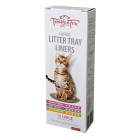
A Look at Inappropriate Urination
Inappropriate urination is characterized by the cat urinating on the floor in an area outside of the litter box. If your cat scratches at the floor or area and squats before missing the target, you can be sure it is experiencing inappropriate urination rather than spraying. A cat with this problem may do it every time it urinates, which is generally twice per day, or only occasionally.
For some cats, inappropriate urination is a side effect of illness or pain. Since it can be caused by illness, it is best to see your veterinarian if your cat is having problems. Simple problems such as diarrhea or constipation can also be the cause. On the other hand, diabetes, bladder infection, arthritis, kidney disease, and senility can also cause your cat to urinate outside their litter box.
With some cats, inappropriate urination is a sign that the cat is experiencing separation anxiety or fear, or is not adjusting well to a change in the family routine. For cats that experience pain when urinating or who were attacked near the litter box, they may associate the litter box with pain or the attack. Therefore, the problem is more psychological and sometimes moving the litter box to a new area can resolve the problem. Keeping the litter box clean and maintaining a regular schedule are other ways to prevent your cat from urinating outside their litter box.

A Look at Spraying
Spraying is urination that is done on purpose in order to mark territory. When a cat sprays, the urine goes on a wall or a door. It is different from inappropriate urination because the cat stands with its tail straight in the air. It will also shift its tail back and forth and it might even shake or quiver. Some cats will assume this position, but will not spray.
Female cats will often spray when they are in heat and male cats will spray as a reaction to inter-cat rivalries. Spraying is a normal, instinctual action for cats, particularly those that have not been spayed or neutered. Therefore, it is helpful to have your cat fixed in order to prevent spraying.
Cats living in a home with many cats are also more likely to spray because the cats have a smaller area to claim as their own and, therefore, they want to mark their boundaries. As the number of cats in the home increases from 1 to 10, the likelihood of spraying increases from 25% to 100%. Therefore, keeping just one cat in the home can reduce the likelihood of spraying.


